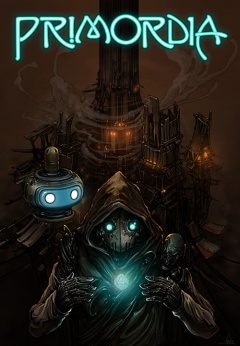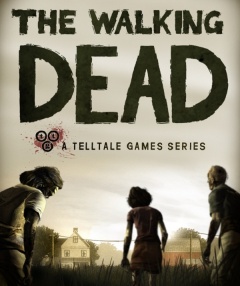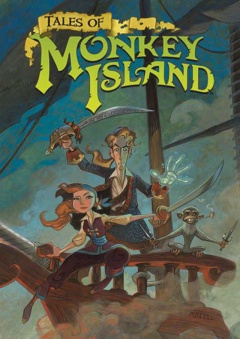point and click
Primordia
 It feels appropriate to end 2012 with a Wadjet Eye game, as this was the year I discovered, bought, and played nearly all of their games. Dave Gilbert has taken his Adventure Game Studio-developed titles from humble roots to full-on publisher in just six years, culminating with this year’s Blackwell Deception, Resonance, and Primordia; a tour de force in indie point and click adventure games. Wadjet Eye Games is the only publisher from whom I regularly preorder games from anymore, in an industry where they will often fall to half their price a few weeks later. But hey, what’s $10 between me and a few great games?
It feels appropriate to end 2012 with a Wadjet Eye game, as this was the year I discovered, bought, and played nearly all of their games. Dave Gilbert has taken his Adventure Game Studio-developed titles from humble roots to full-on publisher in just six years, culminating with this year’s Blackwell Deception, Resonance, and Primordia; a tour de force in indie point and click adventure games. Wadjet Eye Games is the only publisher from whom I regularly preorder games from anymore, in an industry where they will often fall to half their price a few weeks later. But hey, what’s $10 between me and a few great games?
Primordia is their final offering of the year, and it is ambitious. As a robotic steampunk homage to games like Sam and Max, Primordia puts you in the distant future where humans are dead and a variety of robots are all that remains. Wadjet Eye Games tend to be uniquely evocative: the Blackwell series explores death, The Shivah examines religion, Resonance questions the power of technology, and Primordia scrutinizes progress and freedom. These can all be heavy topics, especially for a computer game, but Wadjet Eye always manages to make it about the characters.
For my final review of 2012, let us talk about Primordia, developed by Wormwood Studios and published by Wadjet Eye Games. Monday will feature our sixth annual Game of the Year Awards, so please have a safe and happy new year.
The Walking Dead: No Time Left
 The finale to the first episodic season of The Walking Dead has arrived, and after the shocking conclusion to the fourth episode, it was apparent just how No Time Left would end. Of course, getting there is never straightforward in The Walking Dead universe.
The finale to the first episodic season of The Walking Dead has arrived, and after the shocking conclusion to the fourth episode, it was apparent just how No Time Left would end. Of course, getting there is never straightforward in The Walking Dead universe.
This final review will be rather spoilerific after the cut, so there’s your first warning. It would be massively difficult to talk about the season as a whole without talking about the characters and their relationships, the real core to The Walking Dead. It’s funny: comparing it to my earlier episodic gaming experience, Tales of Monkey Island, and while I’m going to end up awarding them identical scores, it’s for completely different reasons and I feel totally different about each experience. My thoughts are also a lot more complicated when it comes to The Walking Dead.
So with that, let’s talk Lee, Clementine, and the end of the world.
The Walking Dead: Around Every Corner
 The penultimate episode of the first season of The Walking Dead brings our group of survivors to the edge with seemingly no hope for a happy ending. While I’ve certainly enjoyed the previous three episodes quite a bit, I feel like everything has finally clicked for me in Around Every Corner. There’s a great sense of dread, urgency, and horror as you progress, and it successfully caps off the previous three hours with a heart-stopping finale.
The penultimate episode of the first season of The Walking Dead brings our group of survivors to the edge with seemingly no hope for a happy ending. While I’ve certainly enjoyed the previous three episodes quite a bit, I feel like everything has finally clicked for me in Around Every Corner. There’s a great sense of dread, urgency, and horror as you progress, and it successfully caps off the previous three hours with a heart-stopping finale.
Telltale Games wouldn’t have been my first choice for a Walking Dead game, as a popular graphic novel and the most successful show on cable television, the intellectual property owners should have had their pick of the litter when shopping their game. Could Call of Duty: Black Ops II have sold even more with a fully licensed Walking Dead zombie mode? Should the Dead Island developers been tapped? Capcom for their Dead Rising experience? Valve with Left 4 Dead? EA for their gobs of money?
But Telltale’s interactive drama experiment has been a huge success, at least critically. There are bound to be more Walking Dead games in the future, but this will certainly set the bar high. Here’s my review of episode four: Around Every Corner.
The Walking Dead: Long Road Ahead
 If there’s something that Telltale Games teaches its Walking Dead players in Long Road Ahead, it is that everyone is expendable. While I don’t know if everyone’s experience was like mine, I lost four major characters over the course of the episode. Zombies are dangerous in the world of The Walking Dead, but humans are a lot worse. To quote one of the characters, “I don’t believe in strength in numbers.”
If there’s something that Telltale Games teaches its Walking Dead players in Long Road Ahead, it is that everyone is expendable. While I don’t know if everyone’s experience was like mine, I lost four major characters over the course of the episode. Zombies are dangerous in the world of The Walking Dead, but humans are a lot worse. To quote one of the characters, “I don’t believe in strength in numbers.”
I haven’t been quite as blown away by the episodes so far as the rest of the internet are, but I’ve certainly enjoyed them so far. The areas are generally small and there is little exploration or puzzle solving required. I’m reminded again of my original comparison of the game to Heavy Rain, but there was a greater sense of dread in Quantic Dream’s psychological epic than in this zombie-laden drama.
Long Road Ahead was released in late August and it was during this time that I was first exposed to the game through social channels, which is certainly not a surprise considering some of the hellish scenarios the episode puts its players through. While I feel episode three was an improvement over Starved for Help, I’m still looking for a bit more from the game than frantic quick time events.
The Walking Dead: Starved for Help
 I’m not any kind of expert on zombie apocalypse fiction, but from my point of view, there’s two crucial points in the story that every good zombie story needs, and needs to do well. The first is the tension build-up in Act 1. Everyone watching, reading, or playing some sort of zombie media knows there will be zombies. The ones who don’t know are the characters, the heroes whose lives are about to be torn apart by the undead. The more tension the author can build, the more satisfying and terrifying the reveal will be when hell is unleashed.
I’m not any kind of expert on zombie apocalypse fiction, but from my point of view, there’s two crucial points in the story that every good zombie story needs, and needs to do well. The first is the tension build-up in Act 1. Everyone watching, reading, or playing some sort of zombie media knows there will be zombies. The ones who don’t know are the characters, the heroes whose lives are about to be torn apart by the undead. The more tension the author can build, the more satisfying and terrifying the reveal will be when hell is unleashed.
The other crucial part of zombie fiction doesn’t involve the zombies at all, but human conflict. The zombie mythos rule of thumb says that the dead are never the true enemy in zombie fiction and that interesting drama lies in the living. This is true, but drama isn’t necessarily easy or obvious to write, so it’s not a given it’s executed well.
The Walking Dead already featured their tension build-up and zombie reveal in Episode 1: A New Day, but it still surprised me that Episode 2: Starved for Help almost immediately dropped running from zombies in favor of arguing with fellow survivors, but Telltale Games is apparently confident in their story, so let’s take a look.
The Walking Dead: A New Day
 Word of mouth is a powerful, but nearly impossible to control selling tool. Growing up, I rented SNES games based on friends’ recommendations; during college, PC games spread from computer to computer like viruses. But now that I’m an adult working full-time, the break room doesn’t satisfy the gaming suggestion mill. So where do I turn? Twitter.
Word of mouth is a powerful, but nearly impossible to control selling tool. Growing up, I rented SNES games based on friends’ recommendations; during college, PC games spread from computer to computer like viruses. But now that I’m an adult working full-time, the break room doesn’t satisfy the gaming suggestion mill. So where do I turn? Twitter.
Love it or hate it, your reaction to Twitter will be based entirely on the people you choose to follow, and I choose to follow a lot of people in the gaming industry. From developers to journalists, they all seem to be raving about The Walking Dead, Telltale Games’ newest episodic adventure for Windows, OSX, Xbox 360, PlayStation 3, and iOS devices.
Fresh off my completion of Tales of Monkey Island, also from Telltale, I was excited to try out something a bit newer, and The Walking Dead fits the bill perfectly, especially with today being Halloween! So here’s my review of Episode 1: A New Day, I will continue to review the other episodes in the coming weeks, as long as I survive!
Happy Halloween and happy gaming!
Tales of Monkey Island: Rise of the Pirate God
 As the first Monkey Island game in nine years, fans had high expectations for Tales of Monkey Island. Not only is the series one of those coveted, highly nostalgialized, fan favorites from our youth, but the last game, Escape from Monkey Island, simply wasn’t that good. There were a lot of questions whether Guybrush Threepwood is even funny in three dimensions as it had been tried and failed once already.
As the first Monkey Island game in nine years, fans had high expectations for Tales of Monkey Island. Not only is the series one of those coveted, highly nostalgialized, fan favorites from our youth, but the last game, Escape from Monkey Island, simply wasn’t that good. There were a lot of questions whether Guybrush Threepwood is even funny in three dimensions as it had been tried and failed once already.
I certainly had my doubts, I had never played an episodic game before Tales of Monkey Island, so even the delivery method was questionable. I know that TellTale Games has had great success with season gaming, but would it work with Monkey Island? Would the episodes be too long? Too short? Too reliant on cliffhangers? Could a writing staff still capture Guybrush, Elaine, and Chuck?
Five episodes later, I have my definitive answer to all of these questions. Rise of the Pirate God serves as not only the finale for the season, but once again, could be the final chapter in Monkey Island’s 20 year history. Let’s talk first about the episode, and then the series as a whole.
Tales of Monkey Island: The Trial and Execution of Guybrush Threepwood
 After the excellent Lair of the Leviathan episode, I was totally expecting the quality to fall in back to Tales of Monkey Island’s previous levels, good comedy, but not Monkey Island comedy. Thankfully, The Trial and Execution of Guybrush Threepwood manages to sustain most of the momentum of Leviathan in a well written romp that sets out a few pretty unique puzzles for our hero.
After the excellent Lair of the Leviathan episode, I was totally expecting the quality to fall in back to Tales of Monkey Island’s previous levels, good comedy, but not Monkey Island comedy. Thankfully, The Trial and Execution of Guybrush Threepwood manages to sustain most of the momentum of Leviathan in a well written romp that sets out a few pretty unique puzzles for our hero.
So far I’ve really been enjoying Tales of Monkey Island, it isn’t as good as the first three games in the series, but is really well done as an episodic adventure. Breaking out the island hopping into their own chapter has always fit well with Monkey Island, and allows the writers to create more natural cliffhangers and mini-conclusions.
The Trial and Execution of Guybrush Threepwood features a few of its own surprises, which I’ll definitely spoil in the following few paragraphs, if you’re reading this far I guess I’m assuming you’ve either already played the season or don’t care about spoilers at this point.
Tales of Monkey Island: Lair of the Leviathan
 Finally, a hilarious, superbly written, well-rounded entry into Tales of Monkey Island. The first two episodes felt like Monkey Island on the surface, but were lacking in key areas. Lair of the Leviathan may well be the smallest scoped chapter so far, but is highly focused and downright entertaining from beginning to end.
Finally, a hilarious, superbly written, well-rounded entry into Tales of Monkey Island. The first two episodes felt like Monkey Island on the surface, but were lacking in key areas. Lair of the Leviathan may well be the smallest scoped chapter so far, but is highly focused and downright entertaining from beginning to end.
Lair of the Leviathan is the middle child of the series, and TellTale Games could have certainly phoned the it in; most gamers playing this far are probably in it for the long haul, and with an explosive ending in mind, we would have forgotten the stuff in between point A and point B. But writer Sean Vanaman brought the goods and we got a memorable treat.
As I write this, The Walking Dead series from TellTale Games is receiving rave reviews for its own third episode, and while part of me wishes I was keeping up with that series instead of diving into Tales of Monkey Island, I’m very happy to finally be playing the three year old game in one of my favorite series of all time. Better late than never.
Tales of Monkey Island: The Siege of Spinner Cay
 Tales of Monkey Island is my first foray into episodic gaming, but considering the season was finished nearly three years ago, I’m not exactly playing the game as it was originally intended. But considering plenty of people see blockbusters for the first time outside the theater, television seasons are consumed in two or three sittings, and classic rock albums are downloaded one song at a time, it should be expected that good media is good media no matter how it’s delivered.
Tales of Monkey Island is my first foray into episodic gaming, but considering the season was finished nearly three years ago, I’m not exactly playing the game as it was originally intended. But considering plenty of people see blockbusters for the first time outside the theater, television seasons are consumed in two or three sittings, and classic rock albums are downloaded one song at a time, it should be expected that good media is good media no matter how it’s delivered.
Now that I’m used to the controls and inventory system, my experience with the second episode went a lot smoother. I’m still feeling a bit underwhelmed by the whole thing, however, but have come to the conclusion that the episodic delivery is a good mechanism for not only Monkey Island, but the point and click adventure genre as a whole.
Siege of Spinner Cay kicks off, unsurprisingly, right where Launch of the Screaming Narwhal ended. TellTale Games squeezed in a little cliffhanger at the end of episode one to remind you not everything is okay, and honestly, it immediately pays off.
